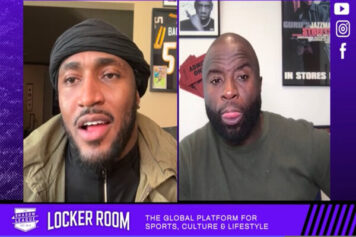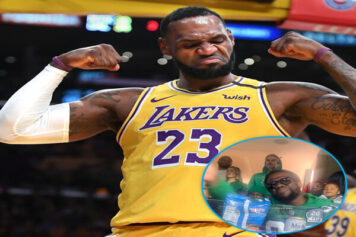The modern African-American athlete has long been charged with a most difficult task, whose origins date back decades before they were even born. During a time that could easily be considered the Golden Age of activism in America, athletes such as Jim Brown, Bill Russell and Muhammad Ali shook up the world in a manner that is greatly missed in the modern era.
They were unafraid to address matters and concerns that were at the very core of the American socio political atmosphere. But there had been a dearth of such socially conscious African-American athletes for three decades or so. Oh, how have many in the media moaned regarding the perceived failure of professional athletes to stand up and speak out in a manner that would be pleasing to the greater portion of their constituency.
The landscape of what is and is not acceptable for the modern athlete has changed a great deal from the days when African-American superstar athletes were expected to be spokespeople for their relative ethnic populations. But the modern economic environment for sports personalities has changed drastically since the old days. Back when Jim Brown was the best football player in the NFL, it was not uncommon for players to supplement their income by being used car salesman and insurance brokers. The very idea of the superstar athlete turned product endorser was not nearly as developed as it is now.
To whom does the superstar black athlete owe his allegiances? The fans? The franchise owner? Or the community from which he was birthed?
For many contemporary NBA fans, LeBron James has the mark of leadership written all over him. He is a superstar athlete that could easily be among the Top 10 to have ever played in the NBA. From the very beginning of his storied career, the royal moniker of King James has been thrust upon him and he is articulate enough to intelligently express his concerns regarding a myriad of issues that are near and dear to African-American communities across the country.
He is to be applauded for his efforts to speak out on the Trayvon Martin murder, the NBA strike and the recent Donald Sterling fiasco. Is it fair for contemporary NBA fans to expect LeBron James and other elite-level NBA athletes to voice their thoughts and opinions on a myriad of issues of concern only to people in depressed African-American communities?
As far as people go, African-Americans tend to be nostalgic and romantic in terms of Civil Rights and activism. We yearned for the days of Jim Brown, at the height of his athletic powers, talking straight to “The Man” and regularly calling him out for his maleficence. We missed seeing Muhammad Ali do the same.
But the middle ground from the distant there to the near here has been paved by athletes who were more concerned with their endorsements and growing their own personal brands. As an individual struggling to feed his family in a capitalist society, can we really blame Michael Jordan for thinking of generational wealth rather than generational oppression?
Do these athletes really owe anyone anything? Revolt TV CEO and founder of The Shadow League, Keith Clinkscales, sat down and discussed his take on the idea of the activist athlete and how our expectations for such individuals may not be fair in the modern context.
“I think we’re in different times and dealing with different pools,” said Clinkscales. “30 years ago, Al Sharpton was on the frontline of the civil rights movement. Now he’s on a show on MSNBC called Politics Nation. His voice has not been modulated, his message has not been weakened or softened. The athletes that exist today, they are operating in a different sphere. Jim Brown and a lot of these guys didn’t have Instagram, they didn’t have Twitter. Any comment that is made can be construed or misconstrued. In order to become a star player you have to get the opportunity to play."
"In our dreams the good guys always look exactly like us and say just what we want them to say. However, the very thing that makes African-American athletes the ideal spokespeople for a myriad of issues pertaining to the community acts as a deterrent as well.
You also have to show a great level of appreciation when you think about all the great levels of talent that come out of college. Sometimes they don’t even get a chance to play. We’re living in different times. I appreciate the romanced notion.“
“I think LeBron is one of the best players in the game and I think that LeBron clearly has a historical place, not only in basketball but in all of pro sports,” added Clinkscales. “I think he wears the mantle of being an excellent athlete well and knows, at times, that his words mean quite a bit and he has not shied away from it. He has not shown any cowardice in that. I feel he is someone who we all can be proud of. And he has done an excellent job at speaking out on issues that are difficult. Issues that have racial implications and issues that have economic implications and he has been responsible, modulated and intelligent as he addresses them.”
But what is it about LeBron James that makes him such an ideal candidate to pick up the mantle that was carried by Jim Brown since the '60s, or is his ability to speak intelligently on a variety issues like gang violence, gun proliferation and muted by endorsement now more than ever? Clinkscales pointed out that articulate NBA athletes are the norm rather than the exception, and that it takes more than good grammar to carry a cause.
“Grant Hill was that way, and there were a lot of others who like that," said Clinkscales. "I think the thing is that I think it’s very rare for someone to be at that level of being a player that is that outspoken. Kobe Bryant has had some difficulties but he has been extremely well spoken. It comes from a different cut, but definitely well spoken. I think in terms of being a champion who has gone through some ups and downs, LeBron James speaks for the modern NBA player quite well.”



